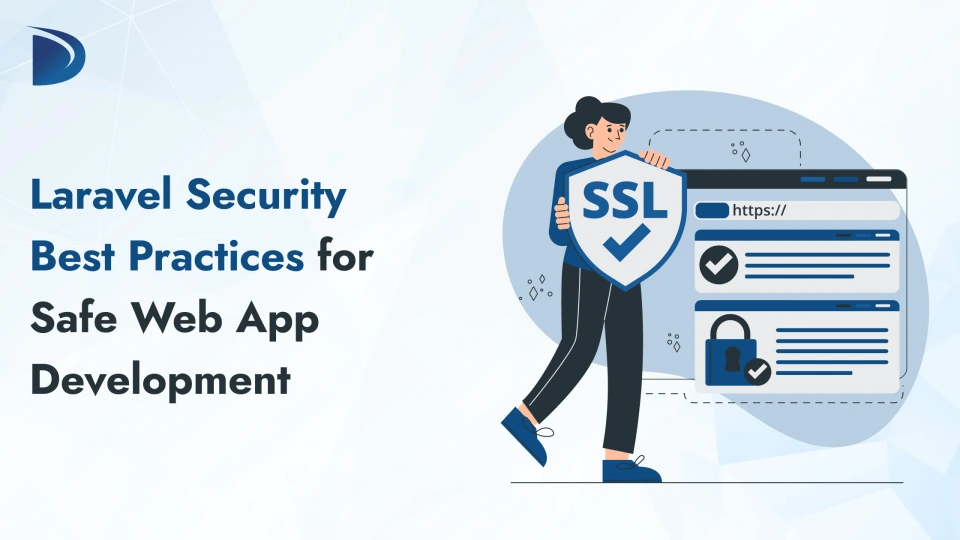Table of Contents
A web application is more than a tool; it is the backbone of your business, reputation, and revenue. However, a security breach or data leak can destroy everything. That is why, at Differenz System, we do not just develop Laravel applications – we secure them from the ground up.
Because many modern PHP applications are built on Laravel, security is essential, not optional. In this guide, we walk you through the best Laravel security practices we apply to every project to ensure enterprise-grade protection, performance, and security.
Why is Laravel preferred for Secure Web Applications?
Laravel is widely known for its elegant syntax, scalability, and developer-friendly tools. More importantly, it includes built-in features that help enforce secure coding practices.
- CSRF protection
- Input validation
- Encryption
- Authentication & Authorization
- Rate limiting
When used correctly, Laravel can serve as the foundation for a highly secure, modern web application. At Differenz System, we take it even further.
Laravel Security Best Practices We Use to Build Robust Web Applications
1. We Keep Laravel and Its Dependencies Updated
Outdated software is a playground for hackers. Laravel and its packages receive regular updates to address security vulnerabilities. We follow strict protocols to:
- Lock down all project dependencies.
- Monitor Laravel security updates.
- Apply patches and perform immediate regression testing.
This is not a one-time task. We provide long-term support and Laravel application maintenance to keep your application secure.
2. We Use Laravel’s Integrated Protection against SQL Injection
SQL injection is one of the most common attack vectors. Laravel’s Eloquent ORM and Query Builder protect against it by using parameter binding.
Instead of writing raw SQL:
DB::select("SELECT * FROM users WHERE email = '$email'"); // Risky
We use:
User::where('email', $email)->first(); // Safe
We train our development team to never bypass ORM best practices. This significantly reduces the risk of SQL injection.
3. We Implement CSRF Tokens Everywhere
Laravel includes CSRF (Cross-Site Request Forgery) protection by default. We reinforce this by:
- Checking tokens in all POST, PUT and DELETE requests
- Using the @csrf directive in every blade form
- Writing tests to ensure that CSRF protection is never disabled
This makes unauthorized command injection almost impossible.
4. We Sanitize All User Input with Validation Rules
Laravel’s request validation and FormRequest classes are powerful tools. We use multi-level input validation:
- Regex pattern
- Type rules
- User-defined rule objects for complex validations
Example:
$request->validate([
’email’ => ‘required|email’,
‘age’ => ‘required|integer|min:18’,
]);
We also log failed validations to monitor potential abuse patterns.
5. We Enforce HTTPS & Secure Cookies
A secure Laravel application must only communicate via encrypted channels. That’s the reason why we:
- Enforce HTTPS with middleware.
- Enable the Secure and HttpOnly flags for cookies.
- Use HSTS headers to prevent SSL stripping attacks.
Want to check if your application is properly enforcing HTTPS? Request a free Laravel security audit from us.
6. We Integrate Content Security Policies (CSP)
CSPs prevent XSS (cross-site scripting) attacks by controlling which scripts can run on your website. While Laravel does not include CSP by default, we use packages like spatie/laravel-csp to:
- Block inline scripts
- Whitelist trusted domains
- Prevention of data injection by third-party tools
Each customer project includes a unique CSP profile based on the tools and plugins used.
7. We Use Laravel Sanctum & Passport for Secure Authentication
Whether you are developing a single-page app, an API-driven system, or a mobile backend, secure authentication is essential.
- Laravel Sanctum for session-based authentication and token-based API authentication
- Laravel Passport for full OAuth2 support
- Role-based access control (RBAC) with Laravel Policies & Gates
We also offer optional multi-factor authentication (MFA) for enterprise projects.
8. We Apply Rate Limiting & Request Throttling
Laravel’s ThrottleRequests middleware protects against brute force and denial-of-service attacks. We:
- Customize limits per route, such as login attempts versus general browsing.
- Integrate with Redis for distributed rate limiting.
- Log suspicious peak values.
Example:
Route::middleware(‘throttle:5,1’)->post(‘/login’, [AuthController::class, ‘login’]);
9. We Monitor Logs and Set Up Real-Time Alerts
Laravel integrates well with external monitoring systems. We:
- Log all exceptions and access attempts.
- Use tools such as Sentry and Laravel Telescope.
- Set up Slack or email alerts for unauthorized activity.
Do you want a real-time view of your Laravel application’s security status? We provide this feature as part of our Laravel support and maintenance services.
10. We Perform Manual Code Audits and Penetration Tests
In addition to automated tools, our lead developers conduct quarterly reviews of all customer applications, checking the following items:
- Hardcoded credentials
- Outdated packages
- Unused endpoints
- Weak access controls
Need proof of our process? We provide audit checklists for each Laravel project.
Security Is Not Just a Feature:
At Differenz System, Laravel security is not a checklist completed at the end; it is integrated into:
- Our project kickoff process
- Every code transfer
- Continuous integration/deployment pipelines
- Post-deployment maintenance
We train our team quarterly on the latest OWASP Top threats and Laravel’s evolving security landscape.
Conclusion
You invest in a Laravel application because you expect performance, reliability, and security. We make sure you get all three.
Whether you are building a new application from scratch or securing an existing one, our Laravel development services make security a core value, not an afterthought.
Talk to our Laravel experts today
FAQs
Is Laravel secure for enterprise applications?
Yes, if implemented with best practices. Laravel is used by startups and Fortune 500 companies alike.
How often should Laravel security be reviewed?
We recommend a full review each quarter and daily continuous monitoring.
Can Laravel support secure APIs?
Laravel Sanctum and Passport are proven solutions for token- and OAuth2-based APIs.
Do I need SSL for my Laravel application?
Yes, all applications should enforce HTTPS to ensure secure data transfer.
What if I already have a Laravel application?
We offer a free Laravel security audit to identify vulnerabilities and develop an action plan.

